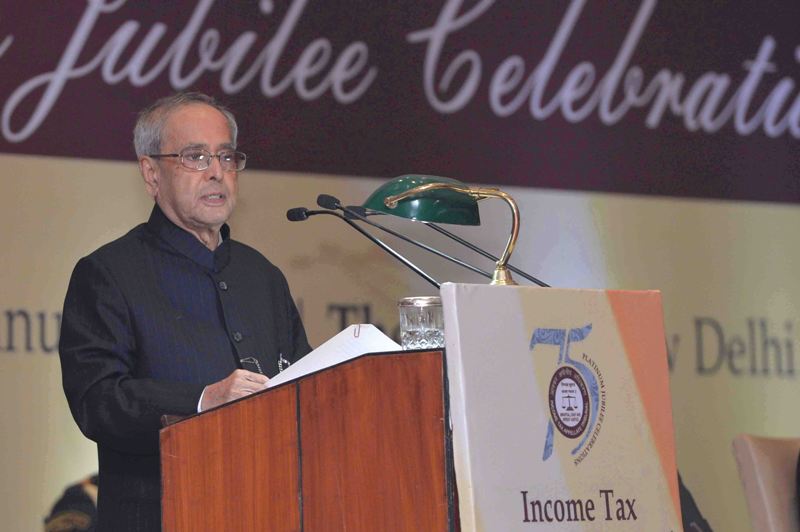
Today, Income Tax Appellate Tribunal completes 75 years of service to the nation through delivery of justice to the tax payers. On this momentous occasion, I would like to congratulate all of you and extend my warm greetings to the Income Tax Appellate Tribunal family and wish for a more productive and fruitful service to the nation in the coming years. The ITAT, since its inception in 1941, has set up new standards for delivery of justice in taxation matters. The established model of ITAT has been used to set up Tribunals in the areas of Indirect Taxes, Administration, Railways and Foreign Exchange. The replication of ITAT model in constitution of other tribunals makes it a ‘Mother Tribunal’ of the country.
2. Income Tax in India was introduced by the Act of 1860. Till the setting up of Tribunal in 1941, the adjudication of tax disputes was through an internal administrative mechanism, which lacked neutrality and independence. The setting up of Tribunal for delivering justice in matters related to direct taxation, laid a foundation for impartial, easy and speedy justice.
Ladies and Gentlemen,
3. The Indian economy has undergone a major change over the years. The collection of direct taxes in 1860-61 was Rupees 30 lakhs, when Income Tax was introduced in India on 24th July, 1860. For the year 2015-16, estimate for direct tax collection is Rupees 7.98 lakh crores. This indicates the rising importance of direct taxation in India since introduction.
Ladies and Gentlemen,
4. The ITAT is the final fact finding authority in the direct taxes litigation system and has been able to create that confidence in the system by keeping an arm’s length relationship with the tax payers and administration. The independence of the Tribunal is most important.
5. The complexity and challenges of the taxation system may lead to grievances amongst the tax payers. The quick resolution of disputes is one of the important ways to reduce grievances of the tax payers. Speedy justice requires a high degree of legal, technical and technological expertise in the organization. It also requires continuous updation of knowledge in the fast changing legal and economic eco-system. I am happy to know that the ITAT has been recognized by the UNDP for its work and is assisting the tax judiciaries of developing countries like Ghana and Nigeria.
I would like to see ITAT playing a lead role in tax jurisdiction where Litigation Management System is in nascent stage.
6. Over the years, there has been sharp increase in direct tax litigations. With the development of Indian economy, the direct taxes and number of tax payers have increased substantially, which have put pressures on the tax dispute redressal system. The Government has responded to these challenges by increasing the number of ITAT benches all over the country. Today we have 63 benches, which operate from 27 stations. The rising trends in tax disputes and the quantum involved in tax litigations, call for an innovative tax litigation management system.
7. Transfer pricing, international taxation and taxation of digital economy are the frontier areas of taxation of modern complex economy, which require special skill sets. Over the years, taxation department has responded to meet the challenges through capacity development. The rising disputes in these areas call for trained manpower in both the tax department as well as in tax judiciary to keep India globally competitive in tax judiciary system. I am informed that during the technical sessions of All India Conference of Members, you are deliberating on three important areas of taxation, relating to –
(i) Tax Jurisprudence in Cross-border Transactions
(ii) Emergence of Technology in Justice Delivery System and
(iii) Tax Litigation viz-a-viz Ease of Doing Business in India.
These three are critical components of taxation policy and litigation management system for providing a stable, fair and equitable taxation regime. I compliment the organizers for selecting these important topics for deliberations.
8. Due to technology, the speed of business has increased exponentially.The tech-savvy entrepreneurs and global Indians demand justice delivery system in line with the best global practices.Meeting the expectations of these twenty-first century entrepreneurs is a challenging job. I hope that members of the ITAT family and the Ministry of Law will respond to these challenges pro-actively.
9. The tax disputes resolution system is an integral component of the eco-system for promoting investments and attracting business. As India looks forward to be an attractive investment destination, you all have to play a very important role in this eco-system. As per World Bank Group 2016 Report, India is ranked at 130 in the ‘Ease of Doing Business’. This status must be improved. Through speedy justice, consistent orders, fair approach and business oriented litigation management system, you can contribute to the growth story of India, which is unfolding itself.
10. The initiative of E-courts, through which members of the Tribunals are disposing cases from smaller stations through video-conferencing model, is laudable.The example set up by the members of ITAT at Ahmedabad by disposing 300 appeals at Rajkot in a month, is an indication of willingness on the part of the members to adopt new processes and procedures, which are technology based. You need to replicate such kinds of practices all over the country and become a true symbol of bringing tax justice at the doorsteps of the tax payers.
Ladies and Gentlemen,
11. Seventy-five years is an important milestone in the life of any organization.Through these years, ITAT has established itself as an organization which follows the best practices and is always committed to evolve. I hope that ITAT and members of ITAT family will continue to excel in their area of work and contribute to the growth and development of the country. Once again, my best wishes to all of you on completion of 75 years and celebration of the platinum jubilee.
Thank you.
Jai Hind.
